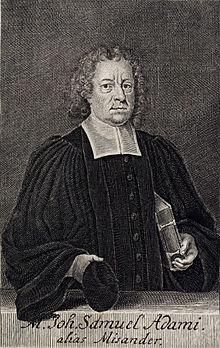Johann Samuel Adami

Johann Samuel Adami , synonym Misander , (born October 21, 1638 in Dresden , † March 13, 1713 in Pretzschendorf ) was a German theologian , writer and linguist.
Life
Johann Samuel Adami was born in Dresden on October 21, 1638, the son of a lawyer . He received his education at the local Kreuzschule , which he attended for several years as a current student and where he became an alumnus of the grammar school. When he started studying in Leipzig , he earned his living with class services and lessons. At the university he attended philosophical and theological lectures. Thereupon he was called back to the Kreuzschule in 1661, which he managed for five years as Regens and during this time he acquired the academic degree of a master’s degree in Wittenberg in 1664 . In 1667 he became a substitute (ie deputy) of the pastor in Rabenau bei Tharandt, in 1672 he received his own pastor's position in Pretzschendorf , where he died on March 13, 1713.
Act
In addition to his work as a pastor, he devoted himself to writing. In his writings he used to call himself Misander. This name is explained as an acronym from his master's degree (M), his two first names Johann (I) Samuel (S), his family name (A for Adami), his place of birth (ND = Neo-Dresden) and his profession and place of work (ER = Ecclesiast [ie preacher in] Rabenau).
Already at the beginning of his activity in Rabenau he was appointed Poeta laureatus by the electoral council, Mr. von Schurtz . Adami composed a sacred song that was included in the 18th century Wroclaw hymnbook . His writings, which had an edifying and in part practical theological character, are only of historical value today. Adami tries to compile edifying writings and at the same time also to influence literary life. Adami is known later as a poet of hymns and as a translator of the satires of Persius (1674).
His main works are the Deliciae (delicacies), a collection of realities which, arranged according to the church festival calendar, should primarily serve the purposes of preaching and contain numerous "histories, symbols and parables " . During Adami's lifetime, 73 printed works written by him are said to have appeared, including spiritual and profane tracts, sermons and corpse abdications as well as practical work for the pastor. The addressees of Adami's writings are not exclusively scholars, but also not trained readers who are to be introduced to self-study.
Works
- The defended, beloved and praised postille rider . 1688, 2nd edition
- The afflicted priest . 1709
- The exemplary priest . 1690
- Poeta laureatus .
- The crucifixion of the flesh . 1710
- The conscientious confessor .
- The consoling priest in the confessional . 1694
- The exemplary priestess .
- The exemplary priest child .
- The crucifixion of the flesh, as instructed in the Sunday and feast day gospels . 1694
- Deliociae passionales . in 5 parts 1707-1710
- Deliciae poenitentiales . 1713
- Deliciae sabbaticae . 2 parts 1716
- The guide to Christianity . 1711
- Historical delights .
- Book lovers and book enemies . 1695
- Florilegium anglicanum . 1705
- Whether the Heiden, Jüden and Türcken children will be happy . an investigation, Dresden 1704
literature
- Gotthard Lechler : Misander, Johann Samuel . In: Allgemeine Deutsche Biographie (ADB). Volume 22, Duncker & Humblot, Leipzig 1885, p. 2 f.
- Johann Matthias Groß: Historical Lexicon Protestant Jubilation Priest . Volume 3, published by Schwabach in 1746
- Johann Anton Trinius : Contribution to a story of famous and deserving scholars of God in the country . Volume 1, published in Leipzig in 1751
- Johann Gottlob Dunkel: Historical-critical news from deceased scholars and their writings . Volume 2, part 4, published in Dessau / Köthen in 1756
- Walther Killy : German Literature Lexicon . Gütersloh, Munich: Bertelsmann Lexikon Verlag 1988, Volume 1, Page 43
Web links
- Literature by and about Johann Samuel Adami in the catalog of the German National Library
- Works by and about Johann Samuel Adami in the German Digital Library
- Publications by and about Johann Samuel Adami in VD 17 .
| personal data | |
|---|---|
| SURNAME | Adami, Johann Samuel |
| ALTERNATIVE NAMES | Johann Samuel Misander |
| BRIEF DESCRIPTION | German theologian, writer and linguist |
| DATE OF BIRTH | October 21, 1638 |
| PLACE OF BIRTH | Dresden |
| DATE OF DEATH | March 13, 1713 |
| Place of death | Pretzschendorf |